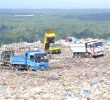DAVAO CITY, Philippines — While it lauded Philippine President Duterte for signing the Paris Agreement, the Philippine Movement for Climate Justice said on Tuesday that it wanted more “concrete and stronger policy actions” from government to address the country’s goal to be independent from using coal.
The PMCJ said that despite previous misgivings, Duterte’s signing of the Paris Agreement could be viewed as a step towards the Philippines commitment to avoid climate change by limiting global warming to well below 2 celsius degree.
“We call on the President to use its mandate to ensure that government agencies will be working hand-in-hand and will serve and protect the interest of the people who are being directly hit by the impacts of the exacerbating global climate change,” Ian Rivera said in a statement Tuesday.
The Philippines, according to Rivera, should lead other countries in demanding from rich countries of there commitment to lessen the impact of climate changes.
This as he claimed that Philippines still remains as one of the most vulnerable countries based on 2016 Global Climate Risk Index.
“PMCJ stands firm that the Paris Agreement is not enough to enact effective and genuine climate actions. The group calls for stronger and concrete policy actions that can directly address and develop programs towards Philippine economy achieving growth not tied with increased consumption of coal,” he emphasized.
With this, PMCJ demanded Duterte’s full support to implement policies that would reduce the country’s dependence in using fossil fuel and shift towards renewable energy.
The Philippines energy consumption exhibits an increasing CO2 emission, PMCJ noted, because of the increasing number of existing coal-fired power plants in the country—counting 26 operational and 36 more CFPPs in the pipeline. In fact, Duterte himself has inaugurated 3 CFPPs in his term.
“The continued burning of coal and other fossil fuels globally will be detrimental to most climate vulnerable countries like the Philippines where economic growth are being eaten up by destruction and devastation,” the group said.
For his part, Climate Change Commission Secretary and Vice Chairperson Vernice Victorio, said that he is confident that the Paris Agreement would allow the country to push for stronger compliance and transparency in the support provided by developed countries for climate action.
“As one of the most vulnerable developing countries to climate change, it is important that we remain a strong voice and advocate of principles of historical responsibility and common but differentiated responsibilities,” Victorio said in a statement.
The Paris Agreement seeks to pursue efforts to limit the temperature increase to 1.5 C above preindustrial levels. It can be recalled that the Philippines was one of the 195 countries that acceded to the Paris Agreement during the 21st Conference of the Parties or COP21 in France last year.
He added that a Declaration will accompany the country’s accession that would ensure that national laws and priorities will be upheld.
Included in this Declaration, he pointed out, is an assertion of the supremacy of the country’s national laws and statement laying the groundwork for comprehensive review of the Philippine Intended Nationally Determined Contributions submitted last October 2015
The review will include a wider consultation on the previously submitted conditional emission reduction pledge of 70% towards the development of the Nationally Determined Contributions (NDC) and will take into consideration our capacity to implement such contribution, support received from developed countries for climate action, and our development pathway,” Victorio added. (davaotoday.com)









